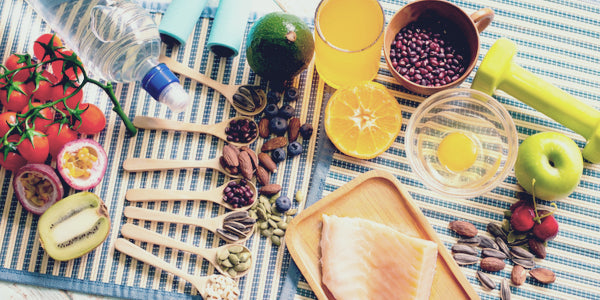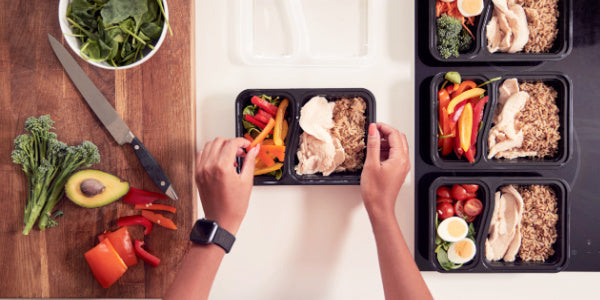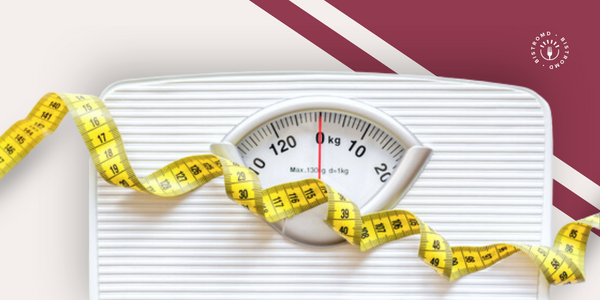
With the goal to lose weight, you sprung right into action after the New Year. Weight loss and maintenance carried until summer and the beginning of the fall season.
And then it happened again... The hustle and bustle of holiday gatherings and festivities detoured your health journey.
But getting back on track after the holidays is achievable with these simple tips!
How to Recover from Holiday Eating
From forgiving yourself to reconsider the scale, use these steps to recover from holiday eating.
1. Forgive Yourself
Let's face it, we are all human! Consuming platefuls of that Thanksgiving dinner or numerous peanut butter cookies is not too unlikely.
So first and foremost, forgive yourself! Not doing so can lead to negative and harsh feelings, which may just turn into more overindulging and emotional eating.
Realize and accept benders can, do, and will occur. The most important thing you can do is forgive yourself and move forward.
2. Reconsider the Scale
Before stepping on the scale, you might want to reconsider. Besides, an increase on the scale following holiday meals is likely not indicative of true weight gain.
Weight naturally fluctuates on a daily basis based on hydration status, bathroom patterns, and other factors. Seeing an influx on the scale can be highly discouraging and may trigger self-doubt. This may drive one to throw in the towel altogether.
Before taking a weight, allow at least a few days. Also stay consistent with weight times, such as on a set day of the week. Being consistent helps expose a true weight loss trend over time.
3. Tackle the Upcoming Days Head On
Feeling full and with low energy, food and exercise may be the last thing on your mind after a holiday celebration. However, it is important to tackle the upcoming days head-on with the two in mind.
Instead of skipping meals, start the day with a well-balanced breakfast. Doing so helps stabilize blood sugar levels and pave the way to healthier choices. It also supplies the body with nutrients that may have been overshadowed in festive holiday foods. Tasty low-carb, high-protein breakfast ideas to get you started include:
• Egg wraps with flexible toppings such as baby spinach, bacon, and shredded cheese.
• Greek yogurt parfaits featuring Greek yogurt, berries, almonds, and other favorite mix-ins.
• Quinoa bowls with sweet and savory options.
• High-protein smoothies including chocolatey and fruity flavors.
• Bagel sandwich with egg, Italian-style omelet, and seven-grain waffles with strawberry compote delivered to your door thanks to bistroMD.
Attempt to step back into a workout regimen and keep as active as possible, too. But if heading to the gym seems too daunting, even a walk in nature can get endorphins and the blood flowing.
4. Start Meal Prepping
Countless celebrations during the holiday season may make it difficult to stick to healthy eating. But as the hustle and bustle dies down, start meal prepping for the upcoming days ahead with these simple steps:
• Step 1: Identify meals and take food requests, especially if cooking for more than just yourself.
• Step 2: Compile a grocery list after figuring out which healthy meals to make. Doing so makes for a swifter trip to the grocery store!
• Step 3: Shop the store's perimeter, as this tends to be where the most nutritious foods are stocked. Not weaving out of the aisles lowers the risk of grabbing chips, cookies, and other snack items.
• Step 4: Chop and assemble purchased ingredients to create portioned or half-way prepped meals.
• Step 5: Organize the meals and snacks accordingly. Items used at the beginning of the week should be stored in the front and so on.
5. Create and Stick to Goals
Though working towards health is a reasonable ambition, create and stick a more overt goal. For instance, sign up and schedule a race in the near future. Create a strategic training plan leading up to the event and aim to stick to it.
And if losing interest along the way, offer personal rewards to keep you on track. A massage after a long morning run or a new pair of running shoes can be helpful incentives to stay motivated.
6. Pour Up Water and Out the Alcohol
Those holiday parties may have led to too many drinks. (And we are not talking water…)
But instead of getting caught up in the after-party, swap out beer mugs and wine glasses for water bottles. Water can improve digestion and help reduce feelings of bloat. All metabolic pathways require water, so drinking it can also help boost metabolism.
While needs vary from one person to the next, the general recommendation is to drink about 64 ounces of water daily. All-in-all, though, aim to drink more water and make it the primary hydration source.
7. Get a Good Night's Rest
Aim to get a good night's rest to ease the recovery process. Getting sound shuteye helps deter cravings, boost energy levels, and improve mood.
The National Sleep Foundation recommends adult men and women to get between 7 to 9 hours of sleep each night. If struggling to achieve good sleep, give these tips a try:
• Stick to regular bed and wake times.
• Drink caffeine only in the morning and early afternoon hours.
• Avoid taking naps, especially in the afternoon hours.
• Cut off screen time at least an hour before bedtime.
• Try to be active throughout the day.
• Forgo large meals before bed to lower the risk of indigestion.
• Calm the mind and body by taking a warm bath or reading a book.
8. Appreciate Food Again
When it comes down to it, food literally is life and keeps the body functioning, sustaining, and living. Instead of looking to "unhealthy" food as the "bad guy," start to appreciate what each food is capable of.
Start to appreciate the wide variety of foods and recognizing just how they benefit the body. This includes bone-strengthening calcium in milk, muscle-building lean protein in turkey, cardio-protecting omega-3 fatty acids in tuna, and cholesterol-lowering fiber in oats.
Really, nutritious food (and water) keeps us to live our best and healthiest life!








